There’s a lot of talk today about the health benefits of chaga mushrooms. If you’ve made it to this blog post, you’re likely ready to move past the hype and get into the details of what makes this mushroom so popular for treating health ailments.
Maybe you’re even ready to start taking chaga on a daily basis. But before you take those next steps you may want to consider: what are the health benefits of chaga mushrooms? How can I take chaga supplements? What are the potential side effects?
We’ll answer all of these questions and more in this post.
But first, let’s quickly review the origins of the chaga mushroom:
Quick facts about chaga mushrooms
Chaga, one of the more popular and well-known medicinal mushrooms, has been used by Eastern populations to treat various health needs for generations. In recent years, the popularity of chaga mushrooms has gained traction in Western cultures as well.
Chaga can be found growing on birch tree trunks and resembles burnt charcoal in the form of a nutrient-rich growth from the wood called “conk”. The conk averages about 10-15 inches in size, and, although the dark black, rough exterior of the chaga is considered aesthetically ugly by many, the mushroom has a soft, orange colored inner core and is proven to contain numerous nutrients.
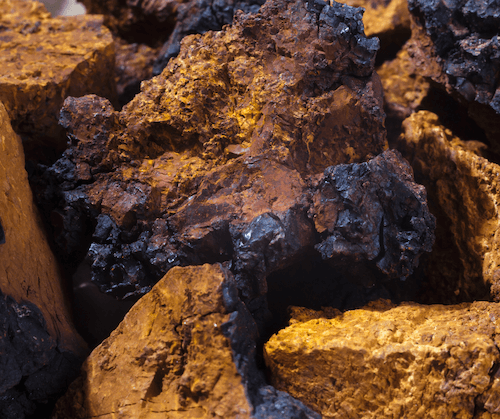
Today, the mushroom is marketed globally for it’s cancer-fighting, antioxidant-rich benefits.
On that note, let’s dive into chaga mushroom benefits on a deeper level…
Chaga mushroom health benefits
Though research is still ongoing about the health benefits of chaga mushrooms, the mushroom species itself has been proven to be full of antioxidants, anti-inflammatory compounds, and nutrients like vitamin B and D, zinc, magnesium, fiber, and more.
This makeup makes chaga a popular choice for preventative care and treatment for a variety of health needs.
Most commonly, chaga is used to help with:
- Boosting the immune system
- Fighting inflammation
- Preventing and/or fighting cancer
- Lowering blood sugar
- Addressing high cholesterol
- Preventing or treating heart disease
- Digestive assistance and constipation
- Treating insulin imbalances
- Preventing side effects of Rx drugs
- Slowing the aging process
- Tuberculosis treatment
- Tumors
Below we outline some key scientific studies that help lend validation to chaga’s health benefits.
.png?width=650&name=Chaga%20Benefits%20(1).png)
May slow the aging process
We live in a world where many people are trying to stay young as long as possible. The good news for those looking to do that in a natural way is that chaga has studies to back up its efficacy for potentially slowing the aging process.
Immune-boosting properties
Chaga’s efficacy for immune-boosting capabilities was proven by scientists in an immune study on mice. The mice were treated with an immunosuppressive alkylating agent called cyclophosphamide. After 24 days of giving the mice chaga water, scientists saw improvement nearly equal to immune levels seen prior to cyclophosphamide treatment, thus validating that chaga can be a strong immune enhancer during chemotherapy.
What makes chaga such a viable mushroom for immunotherapy is that other studies have shown that it stimulates white blood cells essential for positive immune response.
Helps to fight inflammation
In the same camp as immune boosting capabilities, chaga is also known to fight inflammation in the body. One study showed that chaga is helpful for reducing inflammation due to its high antioxidant capacity, as well as fighting harmful bacteria or viruses in the body. Additionally, studies, like this one, have shown chaga may help with gut problems, arthritis, and more by preventing production of harmful cytokines that lead to chronic inflammation in the body.
May help to prevent and fight cancer
Of all the studies done on chaga mushrooms to-date, the anti-cancer and cancer prevention benefits of chaga mushroom seem to have the most comprehensive information to back up efficacy. Numerous in-vitro and mice studies have shown that chaga mushrooms may prevent or slow cancer growth. For example, a study showed that chaga mushroom supplementation may help reduce tumor size by up to 60%. In another study, chaga mushroom was found to be a viable anticancer treatment for hepatoma. A different study found the same results, further validating that chaga supplementation may be a good treatment for various cancers alongside traditional chemotherapy.
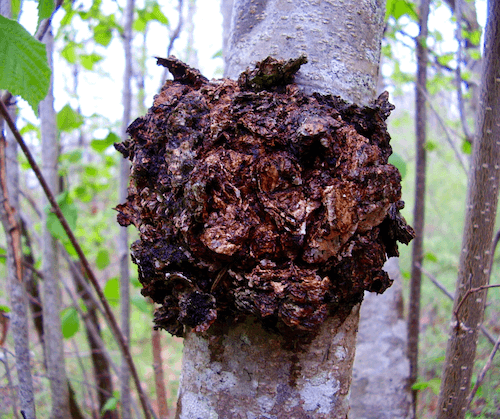
May mitigate drug side effects, including chemotherapy
Research is still in progress to confirm the validity that treating cancer patients with chaga mushrooms could prevent side effects of other treatments (e.g., chemotherapy, radiation, chronic illness).
Extremely high in nutrients
Chaga has been shown to be chock full of beneficial nutrients, including:
- B-complex vitamins
- vitamin D
- potassium
- rubidium
- cesium
- amino acids
- fiber
- copper
- selenium
- zinc
- iron
- manganese
- magnesium
- calcium
These nutrients undoubtedly have played a key role in all of the health research studies conducted.
May help to lower cholesterol
In a study conducted on mice, scientists evaluated the antioxidant and hypolipidemic capacities of chaga mushrooms. They found promising results over the study’s 8-week period, noting “a noticeable inhibition against lipid oxidation induced by free radicals caused by high-fat diet intake on the basis of their antioxidant activities.”
May help to lower blood pressure
The beta-glucans and antioxidants found in chaga tea have been shown to help lower blood pressure. Since those with higher blood pressure are more prone to heart attack, stroke, heart disease, and more, chaga may be a viable supplement for those looking to lower their blood pressure.
May help to manage blood sugar & diabetes
As chaga has been shown to potentially help with chronic illness and inflammation, scientists hypothesized that it may help manage blood sugar and type 2 diabetes as well. Various studies have demonstrated a 31% decrease in blood sugar levels when using chaga mushroom.
May help with the treatment of erectile dysfunction
More research needs to be done, but a study on rats shows strong potential for the use of chaga mushrooms as a treatment for ED. Not to mention, chaga is being researched as a treatment for the physical conditions that can lead to ED including heart disease, high blood pressure, and diabetes. Check out our complete guide to using chaga for ED here.
Important note on chaga studies
Please note that while a few of the studies noted above were done on humans, most studies conducted on chaga mushrooms to-date have either been done on mice or in-vitro. More research is needed in order to support the health benefits for humans noted above, but these studies show a promising future for chaga mushrooms working alongside medications for many well-known health problems.
Please speak to a healthcare professional before you start taking chaga mushrooms for specific health needs.
How to take chaga supplements
Chaga supplements are a popular go-to supplement for people looking to aid overall health. There are numerous ways you can incorporate chaga mushroom supplements into your daily eating habits or health regimens, but the most common supplements include:
-
Chaga tinctures (liquid extract): Chaga extract is the most popular way to consume chaga mushrooms today. Consuming either a water or alcohol-based chaga extract should have positive health benefits. Dual extraction (both water and alcohol) products are arguably the best tinctures to consume. For more dual extraction products, simply add 2 milliliters of your liquid extract (e.g., half an eye dropper) to coffee, tea, water, or a smoothie. Please note that serving size will vary based on product. For more, check out our guide on making chaga tincture at home.
-
Chaga extract (powder): People have been using chaga extract powder for thousands of years. Traditionally, people boil the chaga to make tea but it’s now commonplace to put the extract powder in a hot beverage like coffee or hot chocolate.
-
Chaga tea: Chaga tea has been consumed for generations to aid with digestive health. We have a whole blog on making chaga tea at home, but here are the basics:
-
Measure out 1 gram of chaga powder
-
Boil one cup of water
-
Mix, let steep for at least 10 minutes and enjoy!
-
-
Chaga extract (capsules): Last, but not least, and arguably the easiest way to consume chaga, is with capsuled supplements. The capsules contain the extract powder and can be taken as any daily supplement alongside water or your drink of choice.
When choosing a product that’s right for you, it’s very important to research the company you’re buying your chaga mushrooms from.
Legitimate companies will always publish a third-party COA (Certificate of Analysis), validating their production processes.
For more on chaga supplements, check out our list of the top medicinal mushroom supplement brands on the market today.
Another important consideration is that chaga mushroom supplements are most effective when it’s bioavailability is released using a double or triple extract. These two key points are good things to keep an eye on as you start your chaga mushroom product search.

What are dual-extraction chaga supplements?
Do you really need a dual extraction? To get the most from your chaga, the short answer is: yes.
Chaga mushrooms have two segments of key compounds that you’ll want to make bioavailable to your body through extraction.
And a dual-extraction method is usually best suited to release them.
Let’s dive into the differences:
- Hot water extraction: Releases immune-boosting beta-glucans. Beta-glucans are water soluble. And they are one of the most impactful compounds used in clinical trials. That’s why so many people choose to make tea with their chaga, as steeping in hot water can release these compounds from the tough mushroom exterior.
- Alcohol extraction: Some companies will use a dual-extraction – both hot water and alcohol extraction - so that minor compounds are released in addition to chaga’s beta-glucans. Chaga is jam-packed with healthy compounds including triterpenes, sterols, and betulinic acid. These are best released with an alcohol extraction.
When buying your chaga from a commercial company, look for a dual-extraction powder, capsule, or tincture. Powders and tinctures can easily be added to your tea or coffee. And capsules are great for you to take on the go.
How much chaga should you take?
Dosage for chaga mushrooms will differ person-to-person based on their size, weight, and health status. Recommendations vary, but most studies note that 5 grams or less over the course of a day is a good dose for the average person, with some noting it’s best to not exceed 3.6 grams.
Please consider your own health and well-being before diving into a high dosage.
If you’re just starting your chaga journey, consider starting with a smaller dose of chaga at first to understand your tolerance. Adjust accordingly as you and your doctor see fit.
What are the side effects and interactions of chaga?
Most that take chaga experience little-to-no side effects, but each mushroom affects people differently. The most common and serious chaga side effects reported to-date include:
- Upset stomach from drinking chaga tea
- Bleeding
- Bruising
- Increased blood flow during a surgical procedure
- Aggravation of auto-immune diseases (e.g., Lupus, Arthritis, etc.)
- Low blood sugar
- Weakness
- Confusion
- Irritability
- Extreme thirst
- Kidney damage
Most of these side effects have been seen when chaga is consumed alongside specific medications, so please consult a trusted medical professional before taking chaga in addition to a medication you’ve been prescribed.
For information on potential chaga mushroom interactions or greater detail on potential side effects of chaga mushrooms, check out our in-depth blog post on this topic.

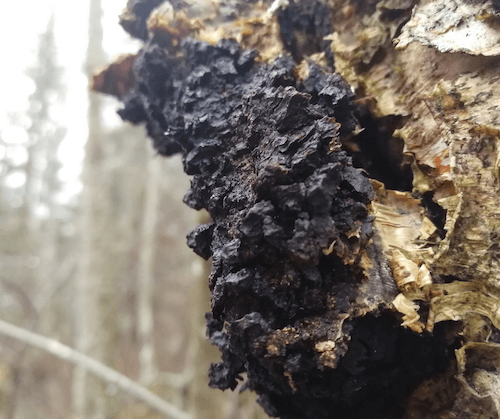
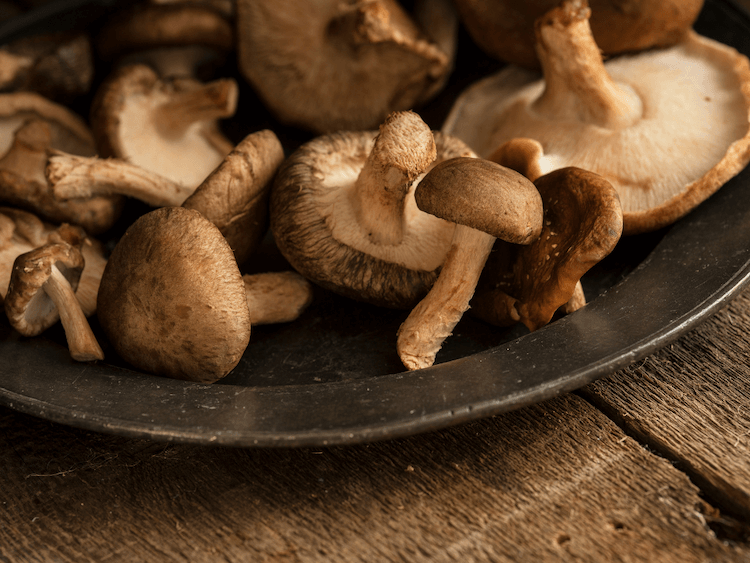
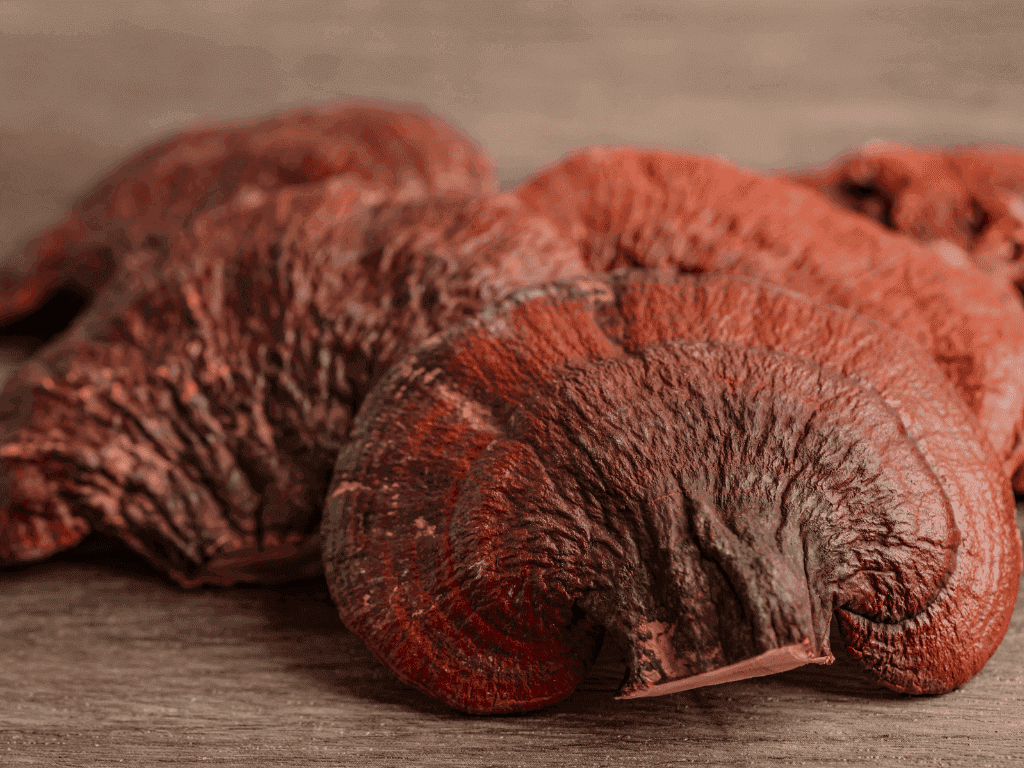


.png)
